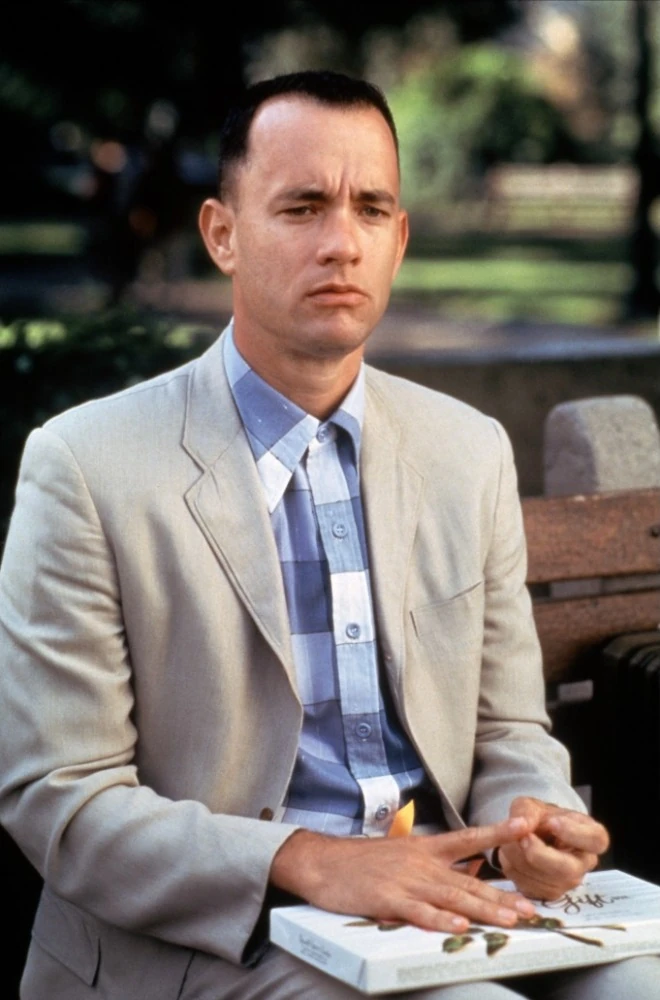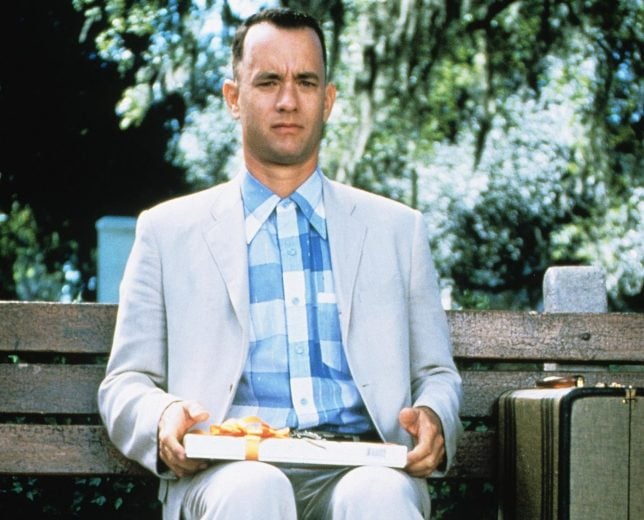Have you ever wondered if Forrest Gump is real? You're not alone. This character has captured the hearts of millions, and his story feels so authentic that it’s easy to think he might actually exist. But here’s the deal—Forrest Gump is more than just a fictional character; he’s a cultural phenomenon that continues to inspire people around the world. So, let’s dive into the question that’s been on everyone’s mind: Is Forrest Gump real?
Tom Hanks brought Forrest Gump to life in the 1994 movie adaptation of Winston Groom's novel. His portrayal was so convincing that it left audiences questioning whether Forrest Gump could be based on a real person. The film’s blend of humor, heart, and historical events makes it easy to believe that Forrest Gump might have walked among us. But as we’ll discover, the truth is a little more complex.
Whether you’re a die-hard fan of the movie or simply curious about the origins of this beloved character, this article will take you on a journey to uncover the facts behind Forrest Gump. From his fictional beginnings to the real-life inspirations that shaped his story, we’ll explore everything you need to know about one of cinema’s most iconic figures. Let’s get started!
Read also:Gigi And Bella Hadid The Dynamic Duo Taking Over The Fashion World
Table of Contents
- The Origin of Forrest Gump
- Biography of Forrest Gump
- Real-Life Inspirations Behind Forrest Gump
- Differences Between the Movie and the Book
- Historical Context in Forrest Gump
- Cultural Impact of Forrest Gump
- Famous Quotes from Forrest Gump
- Controversies Surrounding Forrest Gump
- The Legacy of Forrest Gump
- Conclusion: Is Forrest Gump Real?
The Origin of Forrest Gump
Forrest Gump first appeared in a 1986 novel written by Alabama author Winston Groom. The book was a quirky blend of history, humor, and fiction, featuring a simple yet extraordinary man who unwittingly influences major events in American history. When producer Steve Tisch stumbled upon the novel, he knew it had potential to become a blockbuster film. And boy, was he right!
But here’s the twist—Forrest Gump wasn’t originally intended to be a movie star. Winston Groom created the character as a satirical take on American culture, blending fictional events with real historical moments. The novel’s tone is darker and more cynical than the movie, but both versions share the same core idea: even the simplest people can leave a lasting impact on the world.
How Did Forrest Gump Become So Popular?
Well, it all comes down to timing. Released in 1994, the movie version of Forrest Gump arrived during a period when audiences were craving heartfelt stories with a touch of nostalgia. Directed by Robert Zemeckis and starring Tom Hanks, the film became an instant classic, winning six Academy Awards, including Best Picture and Best Actor for Hanks. It wasn’t long before Forrest Gump entered pop culture lore, sparking debates about his origins and whether he might be based on a real person.
Biography of Forrest Gump
Let’s break it down. According to the movie, Forrest Gump was born in Greenbow, Alabama, on June 6, 1944. He grew up with a loving but overprotective mother and a distant father who rarely played a role in his life. Despite facing challenges like wearing a leg brace due to a curved spine, Forrest’s mother instilled in him the belief that "stupid is as stupid does," encouraging him to overcome his limitations.
Here’s a quick rundown of Forrest’s life:
- Born with a low IQ but a big heart.
- Joins the Army and becomes a war hero during the Vietnam War.
- Accidentally invents shrimp boiling and creates a successful shrimp business.
- Befriends Bubba Blue and learns everything there is to know about shrimping.
- Runs across America multiple times, inspiring millions along the way.
- Falls in love with Jenny Curran, his childhood best friend.
While Forrest’s life may seem too good—or too bizarre—to be true, remember, this is a work of fiction. But what if some parts of his story are inspired by real people? Let’s find out!
Read also:Alex Marquardt Family The Untold Story Of Love Success And Legacy
Forrest Gump's Biodata
| Full Name | Forrest Gump |
|---|---|
| Birthdate | June 6, 1944 |
| Place of Birth | Greenbow, Alabama |
| Occupation | War Hero, Shrimp Entrepreneur, Runner |
| Family | Mother (Mrs. Gump), Father (unnamed) |
Real-Life Inspirations Behind Forrest Gump
Now, here’s where things get interesting. While Forrest Gump himself is fictional, his story draws inspiration from several real-life figures. For instance, his love for running might remind you of Arthur Blessitt, a preacher who carried a wooden cross across America. Similarly, Forrest’s involvement in the Vietnam War mirrors the experiences of countless soldiers who served during that era.
Another possible influence is Michael Stipe, the lead singer of R.E.M., who reportedly inspired the character’s quirky personality and unconventional thinking. Some fans even believe that Forrest’s famous line, "Life is like a box of chocolates," was inspired by Elvis Presley, who once said, "Life is like a sandwich; you’ve got to fill it with the best ingredients."
Is Forrest Gump Based on a Real Person?
Not exactly. Forrest Gump is a composite character, blending traits from various real-life figures and fictional creations. However, the movie’s use of archival footage and historical events creates the illusion that Forrest might have been a real person. This clever technique, combined with Tom Hanks’ Oscar-winning performance, makes it easy to believe that Forrest Gump could have walked among us.
Differences Between the Movie and the Book
Before we go any further, let’s address the elephant in the room. The movie and the book are two very different beasts. While both tell the story of Forrest Gump, they approach it from different angles. The book is darker, funnier, and more satirical, while the movie is heartwarming, sentimental, and family-friendly.
Here are some key differences:
- In the book, Forrest Gump is a lot less innocent and more self-aware.
- The movie tones down some of the more controversial aspects of the story.
- Forrest’s relationship with Jenny is more complex in the book.
- The movie adds several iconic scenes, like the feather floating in the wind, which aren’t in the book.
Despite these differences, both versions of Forrest Gump have left a lasting impression on audiences worldwide. Whether you prefer the book or the movie, there’s no denying that Forrest Gump is a character who resonates with people on a deep emotional level.
Historical Context in Forrest Gump
One of the reasons Forrest Gump feels so real is because of its grounding in historical events. The movie takes viewers on a journey through some of the most significant moments in American history, from the Civil Rights Movement to the Watergate Scandal. By weaving Forrest’s story into these events, the filmmakers create the illusion that he was a participant in real-life history.
For example:
- Forrest meets Elvis Presley and inspires his dance moves.
- He becomes a ping-pong champion and helps improve U.S.-China relations.
- He joins the Army and serves in Vietnam, where he saves his platoon multiple times.
While these events are fictional, they’re based on real historical moments, making Forrest’s story feel authentic and believable. It’s this blend of fact and fiction that keeps audiences guessing about whether Forrest Gump might be real.
Cultural Impact of Forrest Gump
Since its release, Forrest Gump has become a cultural touchstone, influencing everything from fashion to music to politics. The movie’s famous line, "Life is like a box of chocolates," has become a catchphrase, and its soundtrack remains a staple of 90s nostalgia. But the impact of Forrest Gump goes beyond pop culture—it’s also sparked important conversations about disability, love, and the human spirit.
For many viewers, Forrest Gump is more than just a character; he’s a symbol of hope and resilience. His ability to overcome adversity and find joy in life’s simplest pleasures resonates with people from all walks of life. And while he may not be real, his story reminds us that even the most ordinary people can achieve extraordinary things.
Why Does Forrest Gump Matter Today?
In a world that often feels divided and uncertain, Forrest Gump offers a message of unity and optimism. His story teaches us that kindness, love, and perseverance can make a difference, even in the face of overwhelming challenges. Whether you’re a fan of the movie or the book, Forrest Gump’s legacy continues to inspire and uplift people around the globe.
Famous Quotes from Forrest Gump
Let’s face it—Forrest Gump is packed with memorable lines that have become part of our collective consciousness. Here are some of the most iconic quotes from the movie:
- “Life is like a box of chocolates. You never know what you’re gonna get.”
- “Mama always said dying was a part of life.”
- “I’m not a smart man, but I know what love is.”
- “Run, Forrest, run!”
These quotes aren’t just catchy—they’re meaningful. They capture the essence of Forrest’s character and remind us of the simple truths that make life worth living. Whether you’re quoting Forrest to make someone laugh or to offer words of encouragement, his wisdom continues to resonate with people of all ages.
Controversies Surrounding Forrest Gump
Of course, no cultural phenomenon is without its controversies. Some critics have accused Forrest Gump of being overly sentimental and simplifying complex issues like race, class, and disability. Others have pointed out that the movie’s use of archival footage creates the illusion that Forrest was a real person, blurring the line between fiction and reality.
Despite these criticisms, Forrest Gump remains a beloved classic. Its ability to provoke thought and spark debate is a testament to its enduring relevance. Whether you view the movie as a masterpiece or a problematic relic of its time, there’s no denying that Forrest Gump has left an indelible mark on popular culture.
The Legacy of Forrest Gump
As we’ve seen, Forrest Gump is more than just a movie or a character—he’s a cultural phenomenon that continues to inspire and entertain people around the world. From its groundbreaking visual effects to its timeless message of hope and resilience, Forrest Gump has earned its place in cinematic history.
But here’s the thing: even though Forrest Gump isn’t real, his story feels so authentic that it’s easy to believe he might have existed. And maybe that’s the point. In a world that often feels chaotic and unpredictable, Forrest Gump reminds us that even the simplest people can leave a lasting impact on the world.
Conclusion: Is Forrest Gump Real?
So, is Forrest Gump real? The answer is no—not in the literal sense. Forrest Gump is a fictional character created by Winston Groom and brought to life by Tom Hanks. But in a way, Forrest is real to millions of fans who have been touched by his story. His kindness, optimism, and unwavering belief in the goodness of humanity continue to inspire people around the world.
As we’ve explored in this article, Forrest Gump’s story is a blend of fiction and reality, drawing inspiration from real-life events and figures while remaining firmly rooted in the imagination of its creators. Whether you’re a fan of the movie, the book, or both, there’s no denying that Forrest G

